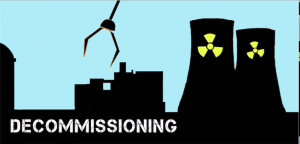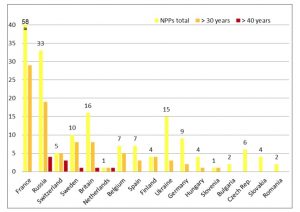Context
This Working Group (WG) on Nuclear Power Plants (NPP) focuses on transparency and safety issues surrounding nuclear power plants. It assesses risks for the population from operation, lifetime extensions / long term operation (LTO) / periodic safety reviews (PSR), and decommissioning of nuclear power installations. It follows procedures for construction, operation, lifetime extension and decommissioning, as well as the structures set up to oversee safety, including nuclear regulatory systems. It focuses on issues of transparency (access to information, public participation and access to justice) and the role of citizens in assessing, overseeing and addressing nuclear risks. A sub-working group concentrates on the introduction of Small Modular Nuclear Reactors (SMRs).
In 2024, the WG NPPs supported NTW members in issues around lifetime extension of NPPs in France, Belgium, the Netherlands and the Czech Republic, especially public participation within these procedures under the Aarhus and Espoo Conventions. It also supported local initiatives in preparation procedures for new nuclear builds in the Netherlands, Poland, the Czech Republic, Slovakia, Hungary and Slovenia.
In 2025, the WG NPPs wants to set up more systematic work on different issues in the form of regular bi-monthly calls to share experiences, and where necessary pool expertise to respond to public participation challenges in strategic environmental assessments (SEA) and environmental impact assessments (EIA) for nuclear lifetime extensions and new construction. Here is the list of objectives for the coming years:
- Follow up of the future public consultations including the participation to the EIA (e.g., on Lifetime extension).
- Follow up of the new European NPP projects (collecting information and sharing them on a dedicated section of the website).
- Evaluation of the industrial and climate change risks for existing and new nuclear in the future (large or small) and consequences in terms of costs (energy transition scenarios comparison).
In January 2025, NTW organised together with the European Commission (DG ENER) and ENSREG a Round Table on the implementation of the Nuclear Safety Directive, especially the relation between transparency and the regulatory system (click here to know more).
NTW critically follows the activities of the SMR Industrial Alliance and intervene in national and local debates around the introduction of SMRs as well as in the European Project EURAD on radioactive waste management (click here to know more).
Achievements
Civil society and European Nuclear Energy Forum (2023)
For the annual European Nuclear Energy Forum of 2023 in Bratislava (Slovakia), Jan Haverkamp’s made a presentation for Nuclear Transparency Watch:
Prior to the ENEF, an hybrid conference was organised by NTW for the civil society focusing on nuclear safety with the following programme:
1/ Small reactors “SMRs” by Antoine Bonduelle (click here for presentation).
2/ Net Zero and Nuclear Energy by Luke Haywood (EEB) (click here for presentation)
3/ Transparency and public participation in the Slovak nuclear industry by Michal Daniska (NTW) (click here for presentation)
4/ New nuclear developments in Bulgaria by Albena Simeonova (NTW) and Petar Kardzhilov (NTW) (click here for presentation)
5/ Situation in France by Marion Rivet (Réseau Sortir du nucléaire)
Presentation at NTW Strategic Seminar (2022)
Yves Marignac (Institut Négawatt) gave a presentation the 27th October 2022, on the “status of nuclear energy in Europe addressing competitiveness, safety and security challenges” (click here for the presentation).
Seminar on Nuclear energy and the EU sustainable finance taxonomy (2021)
Presentation at ENSREG 4th regulatory conference (2017)
Nuclear Transparency Watch was represented by two of its member at this conference, Johan Swahn (MKG) and Jan Haverkamp (Greenpeace) who made a presentation on “NUCLEAR LIFE-TIME EXTENSION JUSTIFICATION and PUBLIC PARTICIPATION” (click here).
Click here to see the full programme.
Seminar on decommissioning (2017)
On 6 February 2017, in Brussels, at the European Parliament, NTW organised a Seminar on “DECOMMISSIONING, A NEW CHALLENGE FOR NUCLEAR SAFETY” hosted by the German MEP, Rebecca Harms (Greens/ALE).
Context of the seminar
The decommissioning of nuclear facilities is one of the major challenges of the coming decades for Europe. A precise agenda of decommissioning is not available yet, but Europe will face a large number of closed down facilities. It is inevitable that facilities will stop, either because their planned lifetime comes to an end, otherwise because of economic, industrial or security reasons. According to statistics from the World Nuclear Association (association gathering producers of energy coming from nuclear power), 14 reactors have stopped operating as a result of an accident or a serious incident, 22 were shut down because of political choices and 97 were closed for economical profitability reasons.
Preparations should be made immediately to manage the massive decommissioning coming. The European Union has currently 131 nuclear plants in operation, 75% run for over 27 years, while the technical lifetime of a reactor ranges from 30-40 years, even though some will be extended to 50-60 years of operation. Europe has already several closed down reactors, but none of these plants have been completely decommissioned. The International Atomic Energy Agency (IAEA) recognizes the final shutdown of 29 reactors in Britain, 28 in Germany, 12 in France, 4 in Bulgaria, four in Italy, two in Lithuania, one in the Netherlands, three in Slovakia, two in Spain, three in Sweden.”
Click here to see the full programme.
Click here to listen to the presentations.
Presentation at ENSREG 3rd regulatory conference (2015)
Nuclear Transparency Watch was represented by three of its member at this conference to speak on Public engagement and Emergency Preparedness and Response:
Public engagement – the benefits and challenges of openness and transparency
One year investigation on emergency preparedness and response in Europe
Click here to see the full programme.
Workshop on the ageing of nuclear power plants (2014)
March 19th February 2014, in Brussels, at the European Parliament, NTW organised a workshop on “ageing of nuclear power plants” hosted by the French MEP, Michèle Rivasi (Greens/EFA).
82% of the European nuclear reactors are today over 30 years old. All European nuclear regulators and utilities are facing problems linked to this ageing of the fleet, which should be broadly understood as the physical degradation of structures, system and components (SSC) as well as the obsolescence of technologies, design, and losses in the transmission of human know-how. Next to that, operators and regulators need to be aware of changes in the environment: over the lifetime of a nuclear power station, population densities around the power station change, as do economic activities and protected natural values, and hence the potential impact of nuclear incidents and accidents.
Technical ageing directly impacts the operational lifetime of nuclear facilities, one of the two key challenges (with nuclear waste) identified by the European Commission in its Strategic Energy Technology Plan. In this framework, the Commission implemented new nuclear safety objectives in the amendment to the original Euratom nuclear safety directive so that plant life-time extension does not expose the workers and the public to additional risks.
For their part, civil society organisations have taken the topic of ageing and its impacts on safety in hand, pressing the signatory states of the Espoo Convention and the Aarhus Convention to formulate obligations for public participation in decisions concerning lifetime extensions of nuclear power stations. They have expressed concerns in many reports as well as in viewpoints in environmental impact assessments that were carried out as a result. NTW strives to organise ongoing discussions on the issue with the European Commission, Members of the European Parliament, nuclear regulators and members of civil society, in order to increase the transparency of the reflections already taking place.
Context of the workshop
“Around one third of the European nuclear reactors are today over 30 years old. All European nuclear regulators and utilities are facing problems linked to this ageing of the fleet, which should be broadly understood as the physical degradation of structures, system and components (SSC) as well as the obsolescence of technologies, design, and losses in the transmission of human know-how.
Ageing directly impacts the possibilities of lifetime extension of nuclear facilities, one of the two key challenges (with nuclear waste) identified by the European Commission in its Strategic Energy Technology Plan. In this framework, the Commission proposed to add new Community safety objectives to the existing safety directive1 so that plant lifetime extension “does not expose the workers and the public to additional risks”. The importance of ageing has also been directly acknowledged by the European Nuclear Energy Forum and more specifically by its Working Group on risks, which is drafting a proposal for a Commission recommendation on “harmonized conditions for the safe long-term operation of Nuclear Power Plants (LTO) in the European Union”2 . This proposal defines among others the responsibilities of license holders as well as of regulatory authorities in charge of implementing harmonised safety LTO conditions.
For their part civil society organizations have taken the topic of ageing and its impacts on safety in hand but with few possibilities of expression. According to its engagement for the application of the Aarhus convention NTW is willing to organize an open discussion with MEPs, regulators and members of the civil society, in order to increase the transparency of the reflections already taking place.”
Click here to see the minutes.
Click here to access to the presentations.
Debate on the revision of the nuclear safety directive in the ITRE committee (2014)


You must be logged in to post a comment.